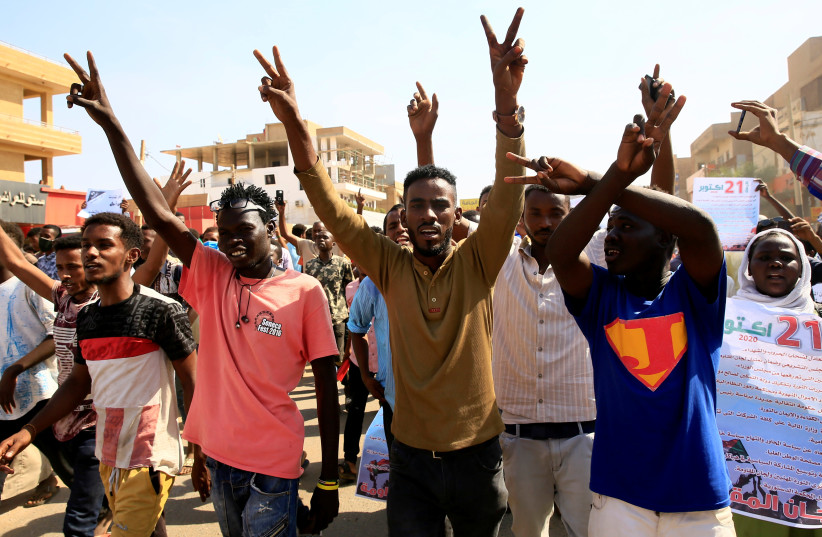Foreign Minister Eli Cohen secured Sudan’s agreement to sign a normalization deal with Israel in a historic one-day trip he made on Thursday to meet with the country’s president, Gen. Abdel Fattah al-Burhan.
“Today’s visit to Sudan laid the foundations for a historic peace agreement with a strategic Arab and Muslim country,” Cohen said after the details of what had initially been a secret trip by a Foreign Ministry delegation were made public.
During the trip, a rough brief text was agreed upon, Cohen said as he spoke to reporters at Ben-Gurion Airport immediately upon his return.
“They want it [the deal], they understand it will contribute to them and we are also ready,” he said.
The actual deal will be signed later this year when the transfer of power from a military to a civilian government is finalized. Sudan’s military, which has been in charge of the country since an October 2021 coup but says it intends to hand over power to a civilian government, is seen as having led the move toward formalizing relations with Israel.

Prime Minister Benjamin Netanyahu’s new government, which has been in power for less than two months, has already touted the pending deal as a victory in a week when it hosted US Secretary of State Antony Blinken and inaugurated Chad’s embassy in Ramat Gan.
“The peace agreement between Israel and Sudan will promote regional stability and contribute to the national security of the State of Israel,” Cohen said.
“Signing a peace agreement will provide an opening for the establishment of relations with other nations on the African continent and the strengthening of existing ties with the continent’s countries,” he added.
Cohen and Foreign Ministry Director-General Ronen Levy, who was with him on the trip, have been heavily involved in promoting ties between the two countries.
The strengthening alliance has the support and backing of the Biden administration, including and Cohen, in his remarks, thanked US President Joe Biden, National Security Advisor Jake Sullivan, Blinken and US Ambassador to Israel Tom Nides.
Sudan is one of four countries that agreed to normalize ties with Israel under the US-brokered Abraham Accords of 2020.
But Sudan never completed the process and has lagged behind the other three Abraham Accord countries – the United Arab Emirates, Bahrain and Morocco – in forging ties with Israel.
It has also not participated, as the other three countries have, in the Negev Forum, which was created under the Biden administration to deepen those regional ties.
Sudan had opposed Israel’s creation and supported the Arab wars against it.
The establishment of relations with Sudan ‘puts an end to 75 years of hostility,” Cohen said.
Cohen underscored that point upon his return to Israel, noting that “previous governments in Sudan worked for Hamas and transferred equipment and weapons to Hamas, which hurt Sudan.
“This [Sudanese] government says loud and clear our face is to the West to the United States to Europe to Israel,” he added.
The inclusion of Sudan in the accords has been highly symbolic because Khartoum has been viewed as the heart of the Arab boycott against Israel.
The Arab League met there after the 1967 Six Day War and established what became known as the three “no’s” of Khartoum. This was “no” to negotiations with Israel, “no” to recognition of Israel and “no” to peace with Israel.
Cohen said Israel was “building a new reality with the Sudanese in which the “Three Nos” will become the “Three Yeses.”
That would be “‘yes’ to negotiations, ‘yes’ to recognition of Israel and ‘yes’ to peace,” he said.
Sudan, which has been in a protracted period of civil unrest, initially delayed joining the accords pending an agreement with the Trump administration to remove it from the US list of State Sponsors of Terrorism.
But even after that removal, the final documentation for its inclusion in the Abraham Accords was never signed, even though it has been counted as accepting them.
Sudan is strategically located on the shores of the Red Sea and is the third-largest country in Africa, with an area of 1.8 million sq. km. and a population of about 47 million, according to the Foreign Ministry.
While in Sudan on Thursday, the Israeli delegation spoke with the Sudanese about ways to assist them in food security, water resources management and agriculture.
He also noted that once the new government is in place and normalized ties are finalized, the door will be opened for Sudanese who sought refuge in Israel to return to their country.
Reuters contributed to this report.
